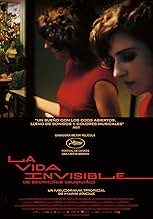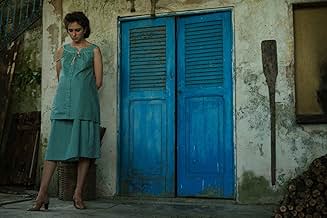La Vie invisible d'Eurídice Gusmão
Original title: A Vida Invisível de Eurídice Gusmão
IMDb RATING
7.7/10
10K
YOUR RATING
In 1950s Rio de Janeiro, two sisters live restricted lives with their conservative parents. After they are separated and forced to live apart, they try to take control of their destinies and... Read allIn 1950s Rio de Janeiro, two sisters live restricted lives with their conservative parents. After they are separated and forced to live apart, they try to take control of their destinies and hold on to the hope of finding one another.In 1950s Rio de Janeiro, two sisters live restricted lives with their conservative parents. After they are separated and forced to live apart, they try to take control of their destinies and hold on to the hope of finding one another.
- Awards
- 38 wins & 53 nominations total
Gregório Duvivier
- Antenor
- (as Gregorio Duvivier)
Featured reviews
What a great movie it is! So beautiful in every sense. It's a very touching journey of two sisters who got separated and had to live separately without knowing each other's existence for a very very long time. Their emotional journey, the struggle and the pain they endure have been filmed so well. The representation of the patriarchy structure of society where the females struggle to live their dreams and how they put their everything for the family, has been shown very nicely. The journey through Brazil of 50's is very beautiful. A must watch!
This movie has many good things in it: the sisters are very well cast and the acting in general is inspired.
Locations, costumes and colors are absolutely on point.
I just didn't really enjoy the plot and the script... I understand that this is meant to be a representation of repressive society, but the characters don't act as normal people would and I find it unnerving since this was meant to be a dramatic/realistic movie.
An immersive experience with great acting and a terrific story. One of the best movies of 2019. Highly recommended!
This film is a piece of art. The acting, the cinematography and the soundtrack are all great. It will make you sad, though. As a woman, it hits me even harder seeing the amount of injustice these sisters went through. One of the merits of this story is that it showed how much women were oppressed in their daily, middle class lives. There's no evil villain here, these girls are victims of their own society, of their own family, of people who don't even realize the extent of the harm they are causing.
I do think it has its flaws, some pacing issues maybe, but overall it's a great movie that actually made me feel the agony, melancholy and frustration of the characters and reflect about how this was (and unfortunately still is) the reality for many women around the world.
I do think it has its flaws, some pacing issues maybe, but overall it's a great movie that actually made me feel the agony, melancholy and frustration of the characters and reflect about how this was (and unfortunately still is) the reality for many women around the world.
Greetings again from the darkness. Masterful storytelling when combined with expert filmmaking is a treasure to be appreciated and enjoyed, even if the story is not so pleasant. Such is the case with this gem from writer-director Karim Ainouz, who adapted the screenplay with Murilo Hauser and Ines Bortagaray from the novel "The Invisible Life of Euridice Gusmao" by Martha Bathala. Based in Rio de Janiero, the film blends the vibrant colors of the area with the traditional and restrictive Latin American family expectations of the 1950's.
The story spans 5 or 6 decades, and when we first meet sisters Euridice and Guida, it's clear they share a tight emotional bond that goes deeper than blood. Though their personalities differ greatly, they are both ahead of their time and out of step with the conventions of the era. Euridice (a strong performance by Carol Duarte) longs for independence and aspires to be a concert pianist after a hoped-for Conservatory in Vienna, while Guida (a powerhouse Julia Stockler) is a dreamer seeking true love, and whose party girl ways must be kept hidden from their conservative father. Both young ladies are spirited, yet respectful.
Their lives are forever altered when Guida runs off to Greece with her sailor lover. As is too often the case with young dreamers, she returns home once her spontaneous choices prove to be poor judgment. Her father rejects his pregnant daughter since, in his eyes, she has disgraced the family. The parents mislead Guida about her sister's whereabouts, so Guida assumes Euridice is off at conservatory fulfilling her dreams. This sets Guida off on her own solitary path.
In actuality, Euridice has married and experienced one of the worst ever wedding nights, featuring what is likely cinema's most unsexy bathroom lovemaking scene. There is an element of horror films to this segment of the film, as the sisters are living their worst nightmares, while being separated from each other ... unable to communicate. The male-dominated Latin culture and family traditions prevent their mother from 'disobeying' the father's order, so the cruel lie continues as the sisters unknowingly live their lives within the same town. There is even one excruciatingly painful-to-watch scene that finds them in the same restaurant at the same time, yet oblivious to the presence of the other.
Each woman's inner-strength pushes them forward. Guida (now Gisele) befriends a wise former prostitute Filomena (an excellent Barbara Santos) who becomes her mentor in poverty. Euridice tries to make the best of her situation while keeping her dream alive. Mostly what we have is a tragic story without one specific tragedy - other than the daughter spurned by her father. There are so many moments of pain and frustration, with undelivered mail being among the worst. The film is beautifully shot by cinematographer Helene Louvart, and it reminds us that 'life happens', and it's not all love and Bach. This is an emotional and heart-breaking story, and devotees of The Lifetime Channel will likely be disappointed in the ending. For me, I have no qualms about the emotional wringer the film puts viewers through - even after the opening scene foreshadowing.
The story spans 5 or 6 decades, and when we first meet sisters Euridice and Guida, it's clear they share a tight emotional bond that goes deeper than blood. Though their personalities differ greatly, they are both ahead of their time and out of step with the conventions of the era. Euridice (a strong performance by Carol Duarte) longs for independence and aspires to be a concert pianist after a hoped-for Conservatory in Vienna, while Guida (a powerhouse Julia Stockler) is a dreamer seeking true love, and whose party girl ways must be kept hidden from their conservative father. Both young ladies are spirited, yet respectful.
Their lives are forever altered when Guida runs off to Greece with her sailor lover. As is too often the case with young dreamers, she returns home once her spontaneous choices prove to be poor judgment. Her father rejects his pregnant daughter since, in his eyes, she has disgraced the family. The parents mislead Guida about her sister's whereabouts, so Guida assumes Euridice is off at conservatory fulfilling her dreams. This sets Guida off on her own solitary path.
In actuality, Euridice has married and experienced one of the worst ever wedding nights, featuring what is likely cinema's most unsexy bathroom lovemaking scene. There is an element of horror films to this segment of the film, as the sisters are living their worst nightmares, while being separated from each other ... unable to communicate. The male-dominated Latin culture and family traditions prevent their mother from 'disobeying' the father's order, so the cruel lie continues as the sisters unknowingly live their lives within the same town. There is even one excruciatingly painful-to-watch scene that finds them in the same restaurant at the same time, yet oblivious to the presence of the other.
Each woman's inner-strength pushes them forward. Guida (now Gisele) befriends a wise former prostitute Filomena (an excellent Barbara Santos) who becomes her mentor in poverty. Euridice tries to make the best of her situation while keeping her dream alive. Mostly what we have is a tragic story without one specific tragedy - other than the daughter spurned by her father. There are so many moments of pain and frustration, with undelivered mail being among the worst. The film is beautifully shot by cinematographer Helene Louvart, and it reminds us that 'life happens', and it's not all love and Bach. This is an emotional and heart-breaking story, and devotees of The Lifetime Channel will likely be disappointed in the ending. For me, I have no qualms about the emotional wringer the film puts viewers through - even after the opening scene foreshadowing.
Did you know
- TriviaBrazil's official submission for the 'Best Foreign Language Film' category at the 92nd Academy Awards in 2020. Runner-up was Bacurau (2019).
- ConnectionsFeatured in Conversa com Bial: Episode dated 4 July 2019 (2019)
Details
- Release date
- Countries of origin
- Official site
- Languages
- Also known as
- La Vie invisible d'Euridice Gusmao
- Filming locations
- Pedregulho Housing Complex - Rua Marechal Jardim, São Cristóvão, Rio de Janeiro, Brazil(elder Euridice's apartment)
- Production companies
- See more company credits at IMDbPro
Box office
- Gross US & Canada
- $146,535
- Opening weekend US & Canada
- $8,127
- Dec 22, 2019
- Gross worldwide
- $1,776,017
- Runtime
- 2h 19m(139 min)
- Color
- Aspect ratio
- 2.39 : 1
Contribute to this page
Suggest an edit or add missing content































